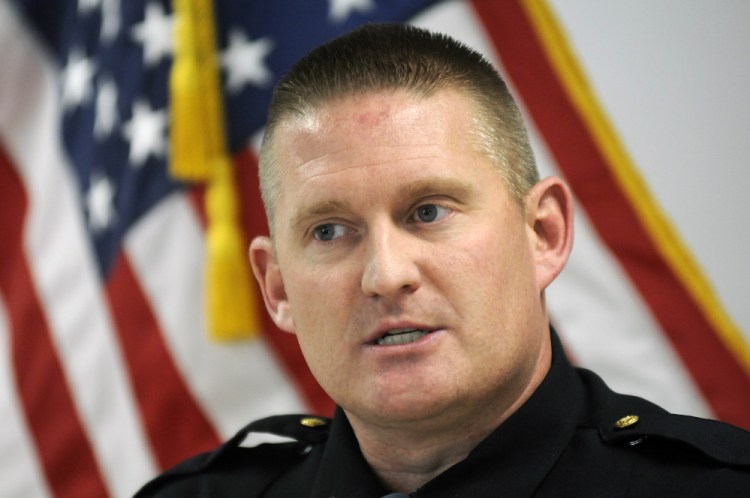AUGUSTA — All Maine police departments would be required to have officers trained to deal with mental health crises by 2017 under a proposal to be considered by the Legislature this year.
The proposal from Rep. Richard Malaby, R-Hancock, would expand crisis intervention team training, a 40-hour class that teaches police to handle situations involving people in potentially violent mental health crises. The class is provided free by the National Alliance on Mental Illness, according to Jenna Mehnert, executive director of the advocacy group’s Maine chapter.
However, police participation in what is known as the CIT program is voluntary and uneven statewide. Some chiefs cite difficulty paying officers during training and filling their shifts, which is what might cause the bill to run into opposition.
In the Portland Police Department, every officer has completed the course. Sanford, a department with 39 sworn officers in 2013, has sent 34 people. More than half of the 41 officers in Augusta’s department have it, and Deputy Chief Jared Mills said the agency deals with people with mental illnesses “by the hour.”
Waterville Police Chief Joseph Massey said six of his 30 sworn officers are trained, and he’d like to see everyone take the class.
“For us, it’s even more critical than the small towns that have no hospitals, no counseling centers and stuff like that,” Massey said, “but we do have that here and we have a high number of folks who receive mental services.”
However, the Maine State Police, the state’s largest police force, with more than 300 sworn officers, and the department involved in the most shootings since 1990, have only sent 31 people to the training since 2005, according to NAMI records. State police spokesman Stephen McCausland said 80 employees have some training on the subject and “we will continue to expand that training and the numbers will increase.”
Smaller police departments are hit or miss: Hallowell, with four officers, and Clinton, with three, don’t have anyone with the 40-hour training.
“Certainly, CIT training is very important and I think that’s evidenced by the large departments,” said Robert Schwartz, executive director of the Maine Chiefs of Police Association. “The small departments would have trouble sending people to it.”
Malaby said he sponsored the bill in part because of continuing cases of police using deadly force against people in mental health crises.
A 2012 series of reports by the Portland Press Herald found that 42 percent of people shot by Maine police since 2000 — and 58 percent of those who died as a result — had mental health problems. The Press Herald investigation also revealed that Maine and rest of the country have failed to employ methods or invest in training that could defuse life-threatening situations with mentally impaired people.
The bill text hasn’t been released yet, but Malaby said it will propose that 20 percent of full-time-equivalent officers in every department go through the 40-hour class within two years. The Maine Department of Health and Human Services pays $90,000 per year to NAMI Maine to provide it. Under the bill, all officers also would have to complete a mental health first-aid class that takes eight hours.
Malaby said the 20 percent threshold is intended to improve departments “in the hinterlands,” where awareness around mental health issues may be lower than in bigger cities and towns.
“Frankly, I suspect that we’re hitting those numbers in many departments, especially the larger ones, but not the smaller, rural ones,” he said. “Really, what we’re looking to do is de-escalate and defuse these situations, because they can be tragic.”
The training is praised by many, but it isn’t a panacea. Officer Laura Drouin of the Augusta Police Department had the training before she shot knife-wielding Jason Begin in a Riverview Psychiatric Center outpatient clinic in January. Police said Drouin was called there after a mental health professional asked for help taking Begin from that office on East Chestnut Street to the state-run hospital’s main facility nearby. Drouin is on leave as the Maine Office of the Attorney General investigates the shooting, both standard procedures for all officer-involved shootings in Maine.
Augusta’s department has a high number of interactions with people with mental illnesses, because of the city’s service center status and Riverview’s presence. Mills said this has made his department good at responding to their needs.
“The training is nice to have, but what we have that everyone else doesn’t have is regular calls to these types of things daily,” he said.
Clinton police have never sent anyone to the training, but Chief Craig Johnson called it “absolutely a must” and said he’ll be working to get officers there. However, his department often has one person on every shift, making scheduling hard.
Schwartz said if the bill draws opposition, it will be “only for the cost reason” as an unfunded mandate on police departments.
Hallowell Chief Eric Nason said incidents involving people with mental illnesses are rare in the city. One such person, he said, comes to the station often, but simply to chat. Nason described that as “a community service type of thing” that he enjoys. However, he said taking one person out of his five-officer department for a week’s worth of training would be difficult on top of other requirements, including labor and Maine Criminal Justice Academy standards.
“They’re all important,” Nason said, “but I’m not sure where the line in the sand is.”
Michael Shepherd — 370-7652
Twitter: @mikeshepherdme
Send questions/comments to the editors.




Comments are no longer available on this story